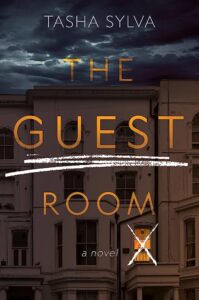What does home turn into when a stranger steps inside? Have you ever considered yourself a trespasser? In many ways, all of us are.
The setting of The Guest Room revolves around the concept of home. The spaces we create for ourselves which at their foundation are meant to be safe – somewhere to retreat, breathe out and do whatever we like away from the eyes of society and the scrutiny of people. My story subverts this, picking apart the nature of a home, and the selves we are within it – how this can be intruded into, both physically and psychologically.
The environment my narrator lingers in most is a small London apartment – one of the millions of boxed spaces inside buildings across Britain’s capital, the same as all people living in a city. Tess’s world shrinks to this place because it belonged to her sister, Rosie, who was found dead in a park a few months before. The police investigation is ongoing, the mystery still unsolved. So the depth of Tess’s attachment and meaning is twofold within her grief – the apartment was her sister’s home, which she doesn’t want to let go of, and there could be clues among Rosie’s possessions.
This setting holds tangible power – in objects. Our belongings speak for us. What we like and buy and surround ourselves with say a lot about our character. I’m intrigued by the fact we call these material items possessions. Thinking of the broader meaning of “possess” and what possesses us – to occupy, hold, dominate or even have knowledge of. For Tess, her sister’s possessions hold memory and love. There is a kind of intensity to them which leaks into other people’s possessions, once she starts BnBing Rosie’s old room. On the surface, her guests’ belongings are a distraction, a curiosity, but below that there is something in Tess trying to reach for relationship and cling to connection of any kind. Looking through someone’s things is a way to know them in secret. It’s an underhand avenue into a person’s life. A form of trespass.
What starts as poking about through suitcases takes a much deeper turn when Tess reads her guest’s diary. Here, the term invasion of privacy flashes to the fore. Yet, this diary and her guest’s belongings are in Tess’s home. She’s invited people in and they are trusting her with their things. Through this, the notion of boundaries and intimacy takes on an interesting tone. In our culture, we create boundaries in order to keep ourselves safe. A home space is mine and unless I’ve asked or said it’s OK, you’re not allowed entry or access. But if you’re invited, then it shifts. Especially if you’re a stranger. As soon as you’re inside my home we are intimate and those boundaries become fluid. Of course, we are meant to respect those boundaries. But the opportunity is created to encroach.
Tess takes this opportunity, to extremes. The home environment that shrinks around her, into objects, becomes an obsession through the diary and what the entries reveal about her guest, Arran. She ignores and crosses his boundaries, trespassing into his personal life, first by reading, then by following him through the streets of London. The small narrowing backdrop of her apartment contrasts in its sudden expansion to crowded city roads. Yet in both settings it’s possible to be an intruder. We all have this possibility. Looking at someone’s phone screen over their shoulder on the underground. Eavesdropping on a conversation. Analyzing the belongings poking out of someone’s bag. Opening the wardrobe in your friend’s parents’ bedroom. Watching the way that woman rubs the underside of her chin, or that man places one hand inside the sleeve of his shirt. Even glimpsing the cover of the novel the person on the bus next to you is reading.
How many of us can say we’ve never done any of these things? In what ways could you have trespassed on someone’s life – either purposefully, or without even realising? In this context, awareness is significant. The security we’ve constructed around ourselves can be unknowingly undermined or infiltrated by other people. Even by those we think of as friends, or by family. Trust is a key theme through the story. We take for granted that we can trust the people close to us. They are our known environment and so we feel safe. But how well can we truly know a person, even when they’re living in proximity, on the other side of our bedroom wall?
People creep in. And it’s fascinating what we fail to notice. We forget how powerful the brain is, in its filtering process. Once in a workshop the facilitator got us to look round the room and remember everything blue. Then we closed our eyes for a few minutes and she asked us to say out loud what’s blue. We could all name a few things. Next, our eyes still closed, she asked: can you tell me an object that’s red? None of us could remember. We weren’t looking for red things so our brains hadn’t noted them.
The implications of this are compelling. What are we not taking in? How many things do we overlook? Especially when we get hooked on particulars, our vision focusing in and getting stuck inside a narrow lens. Tess plays this out, needing to know, desperate to find out – about her sister, about Arran. And she fails to notice the person trespassing on her. Invading her privacy, her personal space – both within her home and on the London streets. There is a creeping sense of eyes on her back. Edging into unwelcome intimacy, close enough to touch her hair, her skin.
Claustrophobia. Created in various layers of The Guest Room. I explore it through the interactions of Tess and Arran in her apartment, in that physical space, but also in psychological space. Arran’s diary is a kind of setting within that exploration. And this other unnamed narrator who is watching Tess. Their psychology and observations close in on her, and close in on the reader’s experience, each character adding pressure to the atmosphere and situation – the hub of which is home. In a city or town, all you need to do is look out of your window and you can see into another person’s life. Across the road or the back of another building, we can easily watch our neighbours.
We peer in or intrude day to day, in diverse ways. There are all kinds of windows. Who among us isn’t curious? How many of us have never spied or had a quick look? Never been drawn in?
***


















